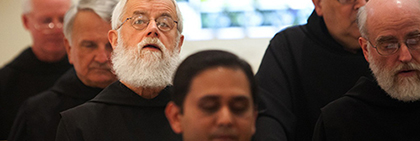
Spiritual Life at a Monastery
Seminarians at Saint Meinrad benefit from the daily example of a community of Benedictine monks.
Spiritual formation for a priest is "the core which unifies and gives life to his being a priest and his acting as a priest" (Pastores Dabo Vobis, 45).
Accordingly, then, a spiritual formation program in the seminary must concern itself not only with the candidate's growth and development while in residence, but also with his continued progress in and faithfulness to the spiritual life after he is ordained and leaves the external supports the seminary offers.
As the Program of Priestly Formation notes, "The final goal of spiritual formation in the seminary is to establish attitudes, habits, and practices in the spiritual life that will continue after ordination. Spiritual formation in the seminary is meant to set the foundation for a lifetime of priestly ministry and spirituality" (6th ed., par. 229).
The seminary program at Saint Meinrad takes its direction from the USCCB's Program of Priestly Formation, which is influenced by Pope John Paul II's 1992 Apostolic Exhortation Pastores Dabo Vobis. In PDV, the four dimensions of priestly formation - human, spiritual, intellectual and pastoral - were first both demarcated and interrelated.
In addition to these documents, the spirit and charism of the nearly 170-year tradition of the Benedictine monastic community of Saint Meinrad Archabbey are certainly treasured assets in allowing us to fulfill this sacred charge of priestly education and formation.
Indeed, St. Benedict's reference to the monastery as a "school of the Lord's service" offers an apt description of a seminary, and it is significant that many practices of Benedictine life are central also to the formation of those wishing to seek God as disciples of Jesus and serve Him as his apostles.
Daily commitment to prayer, the Eucharist and spiritual reading (lectio divina); humble obedience; a certain detachment from secular values; the ongoing process of daily conversion; a genuine spirit of hospitality; a love and concern for community: these regular practices and dispositions of the Benedictine spirit are among those that diocesan seminarians and priests also are expected to embrace.
The Centrality of Prayer
While prayer must be at the heart of the life of every Christian, priests publicly and formally profess their willingness to be known as men of prayer. Indeed, learning "how to be a priest" is, in large part, learning how to be an authentic leader of public prayer and a faithful practitioner of private prayer.
Seminarians at Saint Meinrad participate daily in the celebration of the Eucharist and, following the Liturgy of the Hours, in the communal celebration of Morning and Evening Prayer. Opportunities for the individual celebration of sacramental reconciliation are offered throughout the week, as are regular opportunities for Eucharistic Adoration and Benediction, the Angelus, the rosary, and other traditional and seasonal devotions.
In addition to participating in the Days of Prayer offered throughout the academic year and the twice-yearly Seminary Formation Day, the seminary community makes a group retreat each year. (First-year theologians make a separate eight-day, silent, directed retreat.)
Seminarians are assisted in developing habits of private prayer, including lectio divina and faithfulness to the complete and daily prayer of the Liturgy of the Hours, by information presented in the classroom and by the accountability offered through spiritual direction.
We consider the habit of daily prayer so central to our program that, thanks to the generosity of a benefactor, we provide every seminarian entering Saint Meinrad with the complete four-volume set of the breviary.
Spiritual Direction
"Since spiritual formation is the core that unifies the life of a priest, it stands at the heart of seminary life and is the center around which all other aspects are integrated" (Program of Priestly Formation, 115).
Spiritual direction is especially helpful in assisting seminarians in this integration. The confidentiality characterizing the relationship between a seminarian and his spiritual director assists the seminarian especially "in ongoing vocational discernment, proximate preparation for the reception of ministries and orders, and formation for celibacy" (PPF, 133).
In meeting with his director every two to three weeks, the seminarian has the opportunity to assess his growth according to the human, spiritual, intellectual, and pastoral demands and expectations of seminary life and, ultimately, the priesthood.
Although the spiritual direction relationship functions strictly in the internal forum, the insights obtained through these dialogues assist the seminarian in his accountability to the external, more observable demands of growth in the spiritual life, for it offers seminarians the essential components of challenge and accountability.
Although the PPF states that preparation for celibacy is one of the primary aims of the seminary human formation program (PPF, 90), the spiritual formation program - and especially the spiritual direction relationship - contributes to the opportunities for, and challenges to, growth in this area.
The director of spiritual formation and his associate are contributors to "Together in One Place," Saint Meinrad's comprehensive program of formation for celibacy. A Spiritual Formation Committee composed of student representatives assists in overseeing the program.